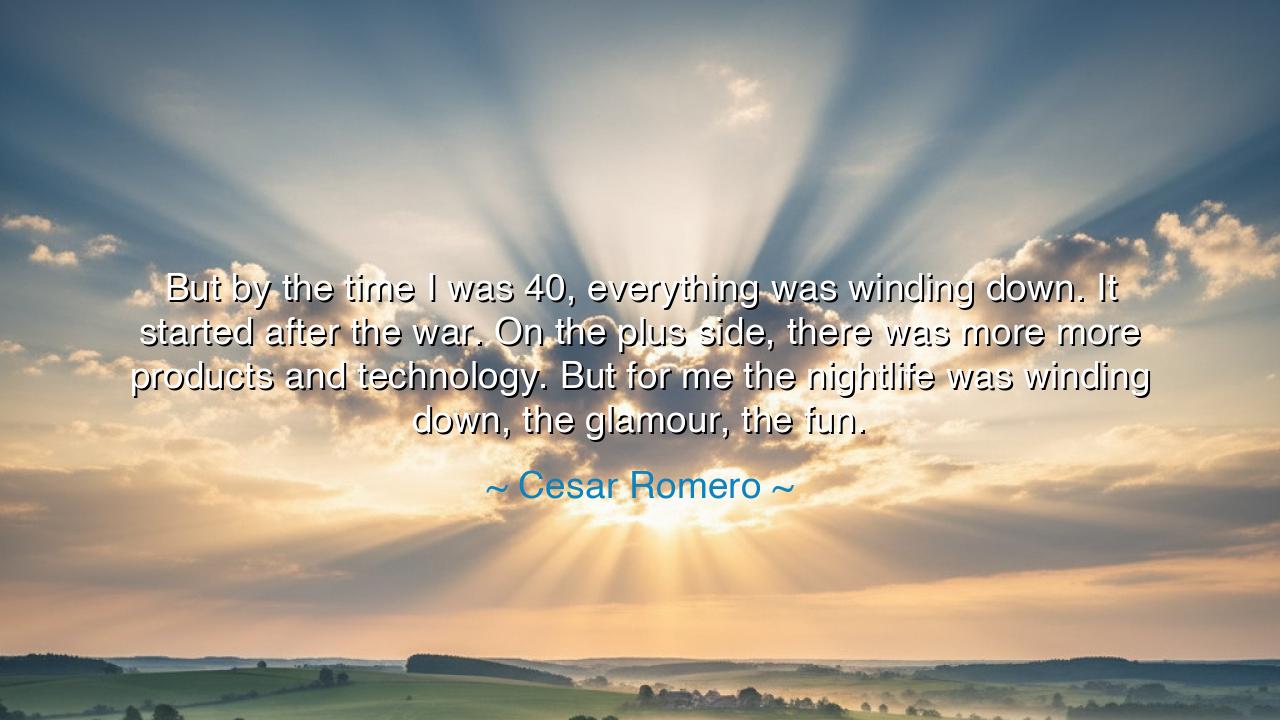
But by the time I was 40, everything was winding down. It
But by the time I was 40, everything was winding down. It started after the war. On the plus side, there was more more products and technology. But for me the nightlife was winding down, the glamour, the fun.






Hear the lament of Cesar Romero, who in his later days looked back and spoke with clarity of heart: “But by the time I was 40, everything was winding down. It started after the war. On the plus side, there was more products and technology. But for me the nightlife was winding down, the glamour, the fun.” These words are no idle sigh; they are a window into the eternal truth of human life—that the seasons of joy and splendor do not remain forever, and that even as the world races forward with invention and progress, the fire of youth dims, and what was once radiant with glamour may soften into twilight.
He speaks of after the war, that great turning point not only in nations but in souls. For wars do not merely end with treaties; they leave in their wake a world transformed. New products and technology flood the marketplace, promising comfort and convenience. Yet with every advance, something is also left behind. The grand halls of dance grow quieter, the clubs that once roared with laughter fall silent, and the radiant lights of nightlife flicker into shadows. What Romero mourns is not only his own passing youth, but the fading of an entire age of fun and spectacle, an age swallowed by the tide of change.
Let us reflect, for his experience is not his alone. In ancient Rome, after the Punic Wars, the people returned to a city enriched by conquest, yet poorer in spirit. Once, the Romans gathered in feasts and festivals, filled with rustic vigor and joy. But with the spoils of empire came luxury, and with luxury came the fading of older traditions. The philosopher Cato the Elder warned that though the city had gained wealth, it had lost the fiery simplicity that once gave it strength. So too does Romero’s lament echo across centuries: progress can bring marvels of invention, yet it may also dim the glamour that once gave life its sparkle.
Yet let not his words be read as despair alone. There is wisdom beneath the sadness. For he reminds us that every age carries its own treasure. Youth is filled with glamour and the dazzle of the night, but maturity holds other lights: wisdom, reflection, and the quieter joys of companionship and memory. What seemed like “winding down” may in truth be the turning of the page, the beginning of a subtler, deeper chapter in the book of life. As a flame burns fiercely at first and then steadies, so too the human soul passes from riotous brilliance into steady glow.
Consider the story of F. Scott Fitzgerald, whose Jazz Age novels immortalized the glittering nightlife and wild fun of the 1920s. In his youth, he was the voice of a generation intoxicated by the rhythm of dance and the thrill of endless parties. Yet by the 1940s, like Romero, he saw that age fading, and with it the illusions of glamour. Fitzgerald wrote in sorrow, but also in truth: that no golden age lasts forever. And yet, because he captured it with words, it continues to live in memory, inspiring countless readers long after the music stopped. This is a lesson—that though the outward lights may fade, the inner fire can still endure if it is preserved in art, in story, or in legacy.
The teaching is thus: do not cling so desperately to the fun and glamour of one season that you blind yourself to the blessings of the next. When one joy winds down, another quietly waits to be discovered. The end of the dance may be the beginning of wisdom, the fading of lights may reveal the stars above. Life is not a single feast, but a procession of moments, each with its own sweetness.
Practical action lies before you. Rejoice in your youth, but do not despair when it fades. Embrace new technology and progress, but do not allow them to overshadow the richness of human spirit. Seek out beauty not only in the nightclubs and the bright lights, but also in the morning sun, the written word, the face of a friend. When one chapter closes, open the next with courage, for life is not winding down—it is transforming. In this wisdom, Romero’s words become not a dirge, but a guide for all who walk the path of time.






AAdministratorAdministrator
Welcome, honored guests. Please leave a comment, we will respond soon